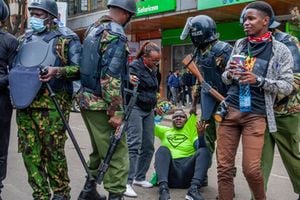
A policeman pursues protesters during the Nane Nane anti-government demos in Karatina town, Nyeri County, on August 8, 2024.
The government is expected to provide a comprehensive statement to parliament on the effects of tear gas that has been used to disperse demonstrators in the ongoing anti-government protests.
The lawmakers also want the police to immediately stop using tear gas as a means of containing protesters, arguing it is against the 1925 Geneva Protocol and the Chemical Weapons Convention of 1993.
Ndhiwa MP Martin Owino has sought a statement from the Committee of Health where he wants the government to reveal the concentration level of tear gas and other irritants it has been using to deal with demonstrators.
“The committee should provide an overview of the concentration level of teargas and other irritants used by law enforcement officers and whether their use is authorised considering the concern of their harmful concerns of their victims,” Mr Owino said.
The second-term lawmaker also wants the government to outline the long term and short term effects and risks associated with teargas exposure, particularly to vulnerable groups such as those with respiratory conditions.

A protester displays posters in a cloud of teargas during anti-finance bill demonstrations on Moi Avenue, Nairobi on June 18, 2024.
He also wants the government to appraise parliament on the strategies and measures put in place to safeguard the public and the alternative mechanism that could be deployed instead of teargas and other irritants that could be used to manage protests, riots and civil unrest.
The lawmaker pointed out that under the Geneva Protocol of 1925 and the Chemical Weapons Convention of 1993, the use of teargas is banned.
The 1925 Geneva Protocol categorised tear gas as a chemical warfare agent and banned its use in war shortly after World War I. The protocol was signed at a conference held in Geneva and took effect on February 8, 1928, according to the United Nations.
Mr Owino pointed out that the protests by the young people of Kenya demanding social change have been met by excessive crowd control measures and the use of chemicals, and feared that this has exposed vulnerable populations such as children, the elderly and those with pre-existing conditions to health risks.
“Scientific research has shown that exposure to teargas and other irritants can cause a wide range of issues ranging from acute to long term effects. The acute effects include irritation of the eyes, skin and respiratory system while long term effects include glaucoma, blindness, respiratory failures and even death due to the chemical burns to the lungs,” Mr Owino said.
Speaker of the National Assembly Moses Wetang’ula directed the committee on health to provide a comprehensive statement addressing all the concerns raised by the lawmaker.







